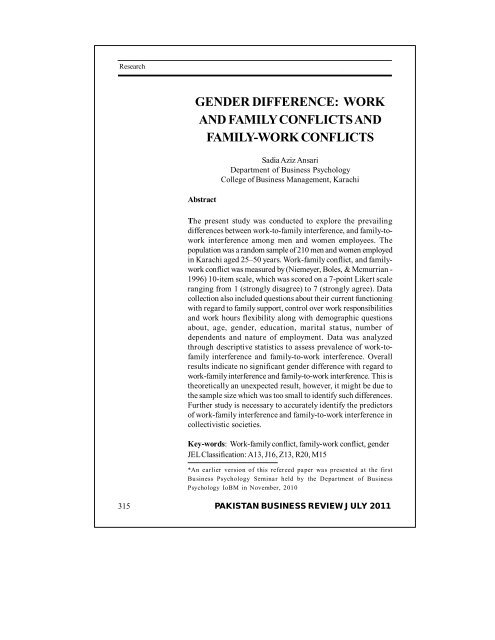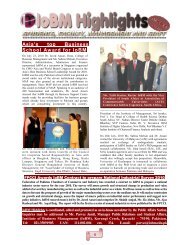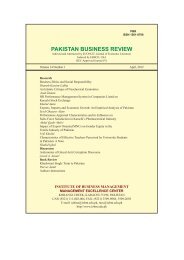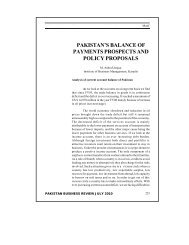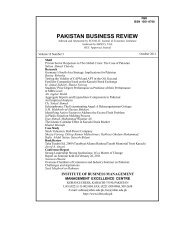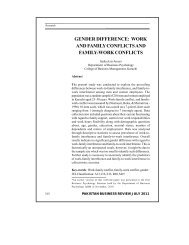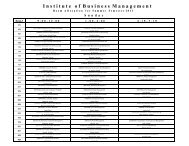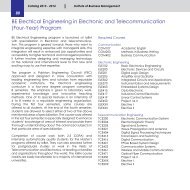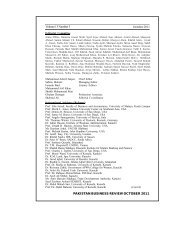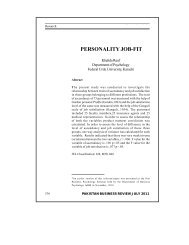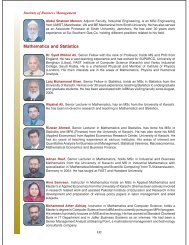PAKISTAN BUSINESS REVIEW - Institute of Business Management
PAKISTAN BUSINESS REVIEW - Institute of Business Management
PAKISTAN BUSINESS REVIEW - Institute of Business Management
Create successful ePaper yourself
Turn your PDF publications into a flip-book with our unique Google optimized e-Paper software.
Research<br />
Gender Difference: Work and Family Conflicts and Family-Work Conflicts<br />
GENDER DIFFERENCE: WORK<br />
AND FAMILY CONFLICTS AND<br />
FAMILY-WORK CONFLICTS<br />
Abstract<br />
Sadia Aziz Ansari<br />
Department <strong>of</strong> <strong>Business</strong> Psychology<br />
College <strong>of</strong> <strong>Business</strong> <strong>Management</strong>, Karachi<br />
The present study was conducted to explore the prevailing<br />
differences between work-to-family interference, and family-towork<br />
interference among men and women employees. The<br />
population was a random sample <strong>of</strong> 210 men and women employed<br />
in Karachi aged 25–50 years. Work-family conflict, and familywork<br />
conflict was measured by (Niemeyer, Boles, & Mcmurrian -<br />
1996) 10-item scale, which was scored on a 7-point Likert scale<br />
ranging from 1 (strongly disagree) to 7 (strongly agree). Data<br />
collection also included questions about their current functioning<br />
with regard to family support, control over work responsibilities<br />
and work hours flexibility along with demographic questions<br />
about, age, gender, education, marital status, number <strong>of</strong><br />
dependents and nature <strong>of</strong> employment. Data was analyzed<br />
through descriptive statistics to assess prevalence <strong>of</strong> work-t<strong>of</strong>amily<br />
interference and family-to-work interference. Overall<br />
results indicate no significant gender difference with regard to<br />
work-family interference and family-to-work interference. This is<br />
theoretically an unexpected result, however, it might be due to<br />
the sample size which was too small to identify such differences.<br />
Further study is necessary to accurately identify the predictors<br />
<strong>of</strong> work-family interference and family-to-work interference in<br />
collectivistic societies.<br />
Key-words: Work-family conflict, family-work conflict, gender<br />
JEL Classification: A13, J16, Z13, R20, M15<br />
*An earlier version <strong>of</strong> this refereed paper was presented at the first<br />
<strong>Business</strong> Psychology Seminar held by the Department <strong>of</strong> <strong>Business</strong><br />
Psychology IoBM in November, 2010<br />
315<br />
<strong>PAKISTAN</strong> <strong>BUSINESS</strong> <strong>REVIEW</strong> JULY 2011


